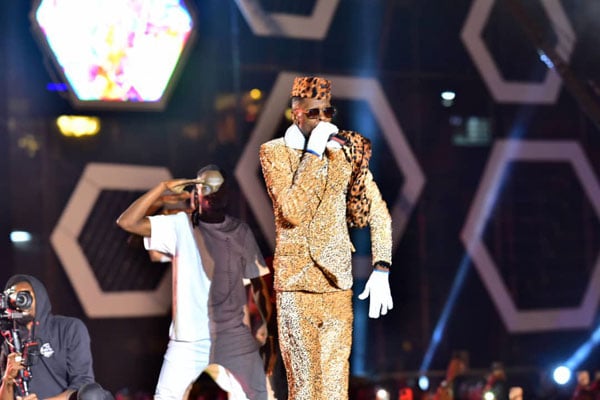Prime
I never thought music would be my career – Mesach

Weak laws: Mesach says the government needs to be serious about protecting artistes’work. PHOTOS/COURTESY
What you need to know:
Discouraged by naysayers and underlooked by those who never understood his music genre, musician Mesach Semakula says he never thought he would make a career in music, able enough to change his life. As he returns to celebrate his career in a concert dubbed 46 years of Mesach Ssemakula, he caught up with Gabriel Buule to discuss his career and Uganda’s music industry
You are organising a Mesach Ssemakula at 46 concert after a while. Why are you celebrating 46 years?
There is not much about the number 46 but that is how I name my shows and I believe that since people gladly celebrate life, they will be able to relate with the name of the show. I am 46 years old and I am so grateful for what I am and proud of my career and whatever God has done for me.
I have been singing for the last 30 years but doing music as a business has been roughly 20 years - a journey worth a celebration.
What should your fans expect?
Well, I am a musician and all I serve is music, so I will use this opportunity to have a musical moment with my fans. My fans should expect a quality music production.
You seem to be focused on doing music. What is your view on musicians who trade more off stage?
I will not speak for others but what I can say is that I am focused on doing what is right no matter what other people feel about it. It is not right to do anything with an intention to prove to others what you are; what is right is to do your work better.
Promoters and musicians claim that much as people turn up in big numbers at shows, the returns do not match up. Where could the problem be?
It is very possible to work and never earn because music is a business like any other and this means that it is susceptible to either losses or profits.
In the heydays of my career, we would order for property such as cars or land just after announcing a music performance and we would earn the money and acquire whatever we wanted.
Today, things have changed, maybe due to the twist in our economic performance. Service providers changed their prices, which also affected the music business.
The public and individual perception about Uganda’s music business affects us service providers, and spaces hike prices with a deliberate assumption that music is a case of earning free money, which is not right.
Also the numbers that people see at venues sometimes never rhymes with the ticket sales; we have people who attend because we give out complimentary or subsidised tickets yet we spend on very many things to pull off a show. Previously you had to advertise on two radio stations but it is not the case today yet the rate card doubled.
However, we do shows for our legacies, branding and later count on opportunities from fans who give us other performance opportunities at a fee.
Do sponsors really invest money or it is just public relations?
Previously, sponsors would invest in music concerts. We would present our budget and they would commit to fund, say 70 percent of the entire budget.
Today, most sponsors stopped, given the increased bad reports about artistes. You realise that most corporate companies do not want to associate with anyone immersed in scandals.
Other companies walked away from the music industry because they had hired foreign nationals in decision making positions who barely understood Uganda’s music industry.
I remember sometimes back, Eagles production had a contract with a particular corporate company and when the CEO was changed, the new one chose to scrape off the deal. However, companies are slowly coming back and I am really proud of MTN Uganda who are always supporting Uganda’s music industry.
Is music created out of passion or as a business?
Initially, I never thought that music could be my job but when I realised that it can make business sense, I chose it as a career.
Together with the friends I started with, we took an important step to consult and learn the business side of music and that is how we have been able to make the best out of the music industry.
You will realise that if those who plan for our country picked interest in the music industry and supported creatives, the sector would make decent revenue for the country and jobs would be created.
Music or the entire art industry is a business that can change lives financially, but the problem is that we have been misunderstood and even the decision-makers are failing to fully support the sector.
As a boy, music was a talent driven by passion but later I realised that it is a noble job that today, you cannot invite me to sing and enjoy; I sing for money.
We are in a society where people demean some professions just because they do not understand them. In our society, many assume that a career means being a professor, doctor, engineer but the fact is that music is among the unrecognised trades creating jobs for many people.
I usually see people trying to disrespect Eddy Kenzo who I am very proud of for managing to change his life and his entire family through music and he has represented our country better than PhD holders.
Those who demeaned us when we were starting are now looking up to us. Whenever I do a music show, I create jobs for hundreds.
If do not hold a concert and a radio advertiser does not make business and so is a cyclist who ferries the audience, the petrol station owner who sells fuel to motorists who attend, among others and this will have a direct impact on the revenue collected by government.
Musicians need to be supported by everyone, including the media.
Do you feel that there is a gap in music leadership?
Before we discuss leadership, we need an independent ministry with technocrats who understand our trade better.
We are currently bundled in the Ministry of Gender and Labour where decision makers have to plan for traditionalists, PWDs, migrant workers among others. We feel like we are treated like vulnerable yet our contribution to the country’s tax base can be doubled if authorities chose to organise artistes under one ministry.
We are sadly not guided and not properly organised; we once approached a powerful person in government and we complained to him about music piracy and he advised us not to put our music in public domain so that no one infringes on our copyright.
He was never aware of music and the digital business and all he knew is that you can record music, organise a show and people come to listen to it, which is not proper.
Do you earn from music streaming platforms?
In Uganda, some people are bullies, owing to the fact that they infringe on our copyright and when we complain, they go further to call and claim that they are helping to promote us.
Before, I never took digital seriously but I later organised my content to claim my digital remits. I also advise musicians to get serious with the digital music business because it is lucrative and you can even pass it on to your offspring.
How do you explain your music and the Ugandan sound?
For years, a section of people have branded us as Kadongo Kamu but that is not our particular music niche, what we do is Afro Pop, though we have a society with people who willingly refuse to comprehend.
Some people are obsessed with modernity and namecall particular things just to belittle others. Kadongo Kamu is Afro pop with a specific sound that differs from the type of Afro Pop that is produced in other parts of Africa.
We use the same chord progression and slightly similar rhythms but we cannot sing the same. Kadongo Kamu as they term it is Uganda’s authentic sound, which we must ride on to cross borders.
Initially it was Kadongo Kamu because singers of that time had no resources to use a wide range of instruments and hence moving with one acoustic guitar, thus the term Kadongo Kamu (one guitar).
Today we can access every instrument to that fact that it is much easier to stage an orchestra.
With this style, I have been able to musically reign supreme in my country as those who despised us are still struggling. It does not make sense to imitate styles that do not resonate with our society and you fail to make it both at home and beyond boarders.
Those who claim that we are singing Kadongo Kamu are the same people trying to sing the same type of music but rather vulgarising it.
We must embrace our authentic music and popularise it so as to penetrate the rest of the world. I was glad when a section of artistes blended our instruments to create a sound called Bax Ragga but still they were demoralised.
Our authentic music resonates with the people and that is why David Lutalo will always be booked at weddings and other functions instead of those who jump high. I am not against new styles but those with new innovations must respect our authenticity.
Is Uganda’s music industry failed by absence of international promoters?
We need a person who should radically promote Ugandan content at a global scale. You will realise that most Congolose musicians crossed borders because of a commitment created by Tamukati Ndongala, a prominent promoter of that term.
We do not have aggressive talent managers and promoters who are willing to invest in that area. The music is there but there is a need to push for the music to cross borders.
Uganda is a taste market for most African music markets and that is an indicator that we can leverage on that to penetrate other markets.
What is your dream?
I want to start a music school to help young talents with hands on music skills. I understand we have uUniversities with music departments but I want to deploy a practical approach to music.
Any regrets in life?
I never finished school but it was not because I wanted to drop out, it was a case of family animosity because family never wanted me to take on music. Because I did not have qualifications, in 2004 I missed out on an interesting international opportunity.
However, because I missed out on that, I gave myself a challenge to educate 40 people to degree level and I am grateful to God that I am steadily counting several degrees and soon the target will be met.
Personally, I wanted to be a lawyer and I hope one of my children becomes one.




